5 Seemingly Healthy Baby Foods to Avoid
- Why manufacturers don’t make baby food desserts anymore…except for baby yogurt
- Why this type of sugar is not more “natural” for babies…and what natural foods have sugar
- Why to steer clear of non-fat and low-fat versions of this food category…and what to buy instead
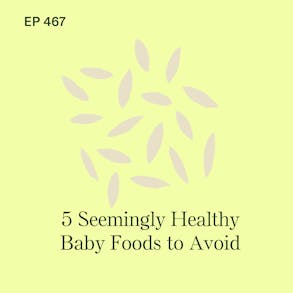
LISTEN TO THIS EPISODE
Episode Description
Food manufacturers love to make “healthy” sounding products for babies to eat and you to buy. In this episode I’m looking at 5 seemingly healthy foods for babies that are actually unsafe…along with substitutes for other foods that are better for your baby.

Links from this Episode
- Baby-Led Weaning with Katie Ferraro program with the 100 First Foods™ Daily Meal Plan, join here: https://babyledweaning.co/program
- Baby-Led Weaning for Beginners free online workshop with 100 First Foods™ list to all attendees, register here: https://babyledweaning.co/baby-led-weaning-for-beginners
Other Episodes Related to this Topic
- Episode 157 - Yogurt: How to Choose the Right Yogurt for Baby-Led Weaning
- Episode 27 - Honey: Why Honey is Dangerous for Babies
- Episode 360 - What's Wrong with Rice Cereal for Babies?
- Episode 246 - Arsenic in Baby Food with Charlotte Brody, RN and Jane Houlihan
- Episode 461 - Are Deli Meats Safe for My Baby to Eat?
- Episode 256 - What Type of Oil Should I Use for Baby-Led Weaning?

Latest Episodes

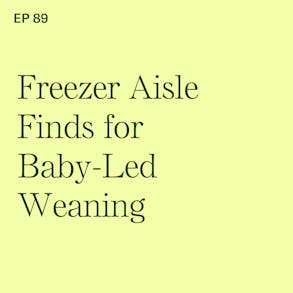
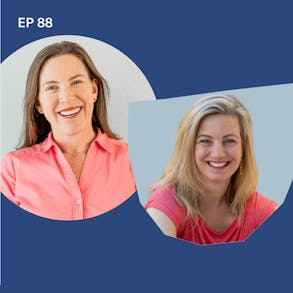
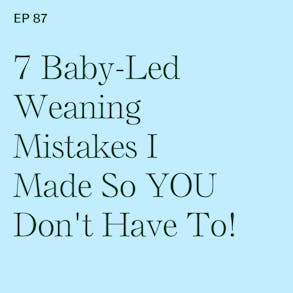
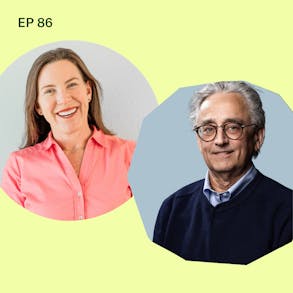
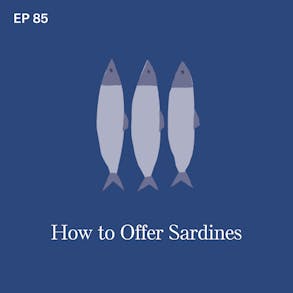
Katie Ferraro (0s):
If you are a type A super planner like me, you love getting organized about what solid foods your baby is going to eat. I have a free feeding guide for you. You're gonna love this one. It's called the Baby-Led Weaning Pantry Planning Guide. It's a 10 page checklist divided by categories of foods Baby-Led Weaning Pantry Planner for free. If you go to my website, babyledweaning.co/resources. Again, that's babyledweaning.co/resources. Click on the Pantry Planner and it's free. Something that I did not anticipate that I would not love as a parent of school age kids is making my kids' school lunches. Okay. I'm so grateful that they're back in school. We're back into a routine, but by the time I get all their breakfast prepared and then all the school lunches made, I have absolutely no time or bandwidth to think about what I am going to eat.
SAP SuccessFactors (49s):
Now as a dietitian, I know how important nutrition is and that's why I love Factors. No prep, no mess Meals Factor is my go-to Workday Lunch solution. They have a full menu of chef crafted meals with options like calorie Smart Protein Plus and keto factors fresh. Never frozen meals are dietitian approved. They're ready to eat in just two minutes. So no matter how busy you are, you'll always have time to enjoy nutritious great tasting meals. If you are looking for a way to minimize your time in the kitchen, a factor meals already in two minutes, no shopping, no prepping, no cooking, no cleanup, head to factor meals.com/weaning50 and use the code weaning50.
SAP SuccessFactors (1m 30s):
That's 50 to get 50% off your first box plus 20% off your next month. That's code weaning50 at factor meals.com/weaning50 to get 50% off your first box plus 20% off your next month while your subscription is active.
Katie Ferraro (1m 49s):
And these are the foods that they're appropriate for kids to and older. But for children under two, we actually want to stick to the full fat versions. And that's because your baby's still developing. Brain will benefit from these fats after age two. I know that your child is getting fat from a variety of other sources, but prior to age two, especially when you're starting solid foods, choose the full fat version of these foods. Hey there, I'm Katie Ferraro, registered dietitian, college nutrition professor and mom of seven specializing in Baby-Led Weaning. Here on the Baby-Led Weaning with Katie Ferraro podcast. I help you strip out all of the noise and nonsense about feeding, giving you the confidence and knowledge you need to give your baby a safe start to solid foods using Baby-Led Weaning.
Katie Ferraro (2m 41s):
Well, hello and welcome back. Today we're going to talk about five seemingly healthy foods that your baby should actually not eat. And I'd like to start out these mini training episodes with a Baby-Led Weaning tip of the day. And today's tip is you might be surprised to learn that there's actually no legally recognized definition of the word healthy for foods in the United States. Okay? There's a lot of very nuanced rules and regulations about health claims that manufacturers can or cannot make in both the advertising of, but also the food packaging on the different food products that they're making and selling to you at the store. But food companies go to great lengths to insinuate health, right?
Katie Ferraro (3m 23s):
They use lots of idyllic images or euphemistic language 'cause they want you to think that their product is ideal for a certain condition or age or healthy as the case may be for your baby. But hang tight, because in this episode I'm gonna share five foods that a lot of parents and caregivers may think are quote unquote healthy for their babies, but really are foods that you can totally skip. And I will also provide some alternatives to those foods too, because I don't want you to walk away from this episode thinking like, oh my gosh, it's just a list of foods my baby can't eat, okay? Because in fact, there are so many foods that your baby can eat. And that's the whole point of Baby-Led Weaning is that it dramatically opens up the world of foods that your baby can eat.
Katie Ferraro (4m 6s):
Because if you just go to your grocery store and you look at the processed baby food in pouches on the shelf, you'll count at most, maybe 12, sometimes 15 different foods, okay? And if your baby's like most conventional adult-led spoonfed babies, by the time they turn one, they're only gonna have 10 or 15 foods under their belt. It's mostly gonna be fruits and vegetables. They're not gonna try different textures. They won't have had the allergenic foods. They're not even eating real food, right? It's liquified fruits or vegetables when your baby needs to be practicing and would benefit from practicing with lots of different finger foods in the allergenic foods and different protein foods. And so with Baby-Led Weaning , there's an infinite number of foods essentially that you can modify and make safe for your baby to eat.
Katie Ferraro (4m 46s):
And that's part of the reason why back in 2016, I created the original a 100 First Foods approach to Baby-Led Weaning was to give you a list of a hundred foods that you can offer your baby before they turn one. Because we know that as you cross over that one year mark into the second year of life, your child will become somewhat of a picky eater. Picky eating is developmentally appropriate. It is not a problem to be fixed, but we know that Baby-Led Weaning can help reduce the severity of picky eating, right? Because if your kid only has 10 or 15 foods by the time they turn one and you lose those 10 or 15 foods to picky eating, that becomes a very challenging child to feed. But if your baby has a hundred foods they can eat and then you lose 10 or 15 of them to picky eating, it's really not a big deal because you still have 85 or 90 foods that the baby can't eat.
Katie Ferraro (5m 29s):
If you'd like to grab a copy of my original 100 First Foods list, I give it away to everybody on my free online workshop called Baby-Led Weaning For Beginners . You can sign up for that workshop and take it later today or tomorrow whenever your baby's napping, whatever works for your schedule. And at the end of it, everybody gets a copy of the 100 First Foods list. Rent it out, put it on your fridge, and start knocking off all of the foods that your baby can eat. You can sign up for that free workshop, Baby-Led Weaning for Beginners at babyledweaning.co/workshop. So let's get started Looking at five seemingly healthy foods your baby should not eat. The first one is kind of a no brainer, and it's baby Yogurt.
Katie Ferraro (6m 10s):
I think the fact that there's still even baby Yogurt on the shelves at grocery stores is a travesty. I remember my mom, who's also a dietitian and a mom of six, she told me that back in the day, they used to have baby food desserts on the grocery store shelf. So they were like back Prepo era when everything was in jars. And blueberry buckle is one that I know she always mentioned. It was literally like a sweetened dessert product intended for babies. Like totally asinine, right? Because babies shouldn't be having any added sugar. In fact, the American Academy of Pediatrics recommends against giving your baby or child foods with added sugar, and then until age two, now a little bit of cake on your baby's first birthday. Is that gonna be the end of the world?
Katie Ferraro (6m 50s):
No, certainly not. But the idea that you would offer your baby a baby food dessert every day, and an idea by the way that was promoted by the baby food industry to sell you more blueberry buckle baby food dessert, absolutely asinine. Same thing goes for baby Yogurt. Okay? Babies could eat real Yogurt, and I know the Yogurt aisle is overwhelming, but spend five minutes there, find yourself off full fat Yogurt that has no added sugar and make sure it's plain, plain meaning it's not vanilla, okay? Because vanilla has added sugar in it, full fat. 'Cause we don't want reduced fat or non-fat dairy products or babies. And I'll talk about why in a moment. And then you also, it just has to be a regular, like it can be Greek, it can be Scandinavian, it really doesn't matter. Those are varieties of texture, but we want no added sugar.
Katie Ferraro (7m 32s):
And the problem with the baby Yogurt is that it has added sugar. And I've been approached by a number of different nationally recognized brands that have a baby Yogurt product. And Katie, will we promote this? Like no, absolutely not. Why is there added sugar in the Baby Yogurt product? Of course, the baby is going to like the sugary Yogurt more than the plain Yogurt. There's nothing wrong with the plain Yogurt, and we don't want babies to get in the habit of eating foods that have added sugar in them, right? Your baby has already tasted sweet. I hate to break it to you, right? Have you ever like tasted breast milk or formula, the natural milk sugar in there lactose? That's what provides the carbohydrate, and it does have a sweet taste, right? So some dairy foods are sources of natural sugar, as are other carbohydrate foods like grains, fruits and vegetables have naturally containing sugars, and those are perfectly fine for your baby.
Katie Ferraro (8m 19s):
We just wanna steer clear of the added sugar. So how do you know if a Yogurt is appropriate for your baby? Flip it over or read the label. If it has zero grams of added sugar, then that one's okay to give to your baby. Also, steer clear of the ones that have artificial sweeteners in them. So non-nutritive or artificial sweeteners, those are chemical products that are added to adult diet foods to make them taste sweeter. We don't offer those to babies either. If you'd like to learn more about selecting a Yogurt for your baby, go check out episode 157. It's called Yogurt How to Choose, the Right Yogurt for Baby-Led Weaning. Spoiler alert, you don't need to buy a specialty baby Yogurt product, but if you're at the grocery store, take a second, find the baby Yogurt, turn it over, look at the added sugar there and be like, this is a joke.
Katie Ferraro (9m 1s):
And hopefully someday we'll get to a point where there are no baby Yogurt products available for sale because they're totally unnecessary, and your baby can eat real Yogurt. The second food that seems healthy, but you can totally skip is Honey. So the primary concern is that Honey can contain spores of Clostridium botulinum, okay? That's a bacterium that produces toxins that are harmful to infants, okay? So these spores are generally harmless to older children and to us as adults, but your baby's immature digestive system can't handle them. So that can lead to a very rare but serious condition called infant botulism. And I've seen some other fairly influential people in the baby space kind of discounting this idea like, oh, it's not really a big concern. And Honey is fine. Actually, if you look on the FDA website, we have seen issues of death related to infant botulism in recent history.
Katie Ferraro (9m 47s):
Okay? And so how does this happen when a baby ingests Honey, this spores can germinate in the intestine, which produces the botulinum toxin, that in turn causes muscle weakness, breathing difficulties, and in severe cases can be life-threatening. The deal with Honey is that it has this perception of being more natural also heads up. There's no legally required definition for the term natural. It's like healthy, like you can call in this country pretty much anything natural, no matter how highly processed, fake, et cetera, it is. So the perception of well Honey, it comes from a bee, it comes from nature. It must be natural and good for me, not necessarily Honey, despite being natural is still a form of sugar. And as I mentioned, babies do not need any added sugars in their diet.
Katie Ferraro (10m 27s):
They get all of the necessary nutrients that they need, breast milk from formula and from the solid foods that you're starting to feed them. Plus as an added sweetener, if you have to sweeten foods with a sweetener like Honey just to quote unquote, get your baby to eat it, that's not ideal. Okay? We don't wanna hide or mask the flavors of the foods we're trying to introduce your baby to, and we also don't want to encourage them to have a preference for sweet foods, which can contribute to some undesirable eating habits later in life. If you wanna learn more about the details regarding Honey and other added sweeteners, go listen to episode number 27. It's called Honey and Why. Honey is Dangerous for Babies. Hey, we're gonna take a quick break,
Aruba Tourism Authority (11m 11s):
but I'll be right back. Making everyone happy on vacation isn't easy, but you know it is going to Aruba. All you have to do is walk out your door to find pristine pools, relaxing white sand, beaches, and an island teaming with outdoor activities. That'll put a smile on any face. You won't just feel great. You'll all feel great filled with a calmer, more peaceful vibe that radiates aruba's warmth. And the best part is it never fades. That's the Aruba effect. Plan your family trip at aruba.com.
Katie Ferraro (11m 47s):
The third food that's seemingly helpful, but you can totally skip is rice cereal. Okay? Rice cereal is oftentimes marketed as a first food for babies because of the fact that it's iron fortified and it's quote unquote, easily digestible and non-allergenic or hypoallergenic. But it's not ideal because rice foods can contain arsenic. Arsenic is a concern as a heavy metal that it could potentially build up to toxic levels in the baby. Many different types of foods preferentially take up arsenic with rice, sweet potatoes being a little bit more on the common side. We've covered arsenic in depth on the podcast with a number of different experts coming on to talk about arsenic. But the bottom line at the end of the day is that most major health bodies recommend against the regular use of rice foods in babies because of the potential for arsenic toxicity.
Katie Ferraro (12m 36s):
There are lots of other ways to offer your baby naturally containing food sources of iron, be that from animal or plant sources. You can skip the rice cereal. I have a number of different episodes about arsenic and rice cereal that I'll link to in the description and the show notes page for this episode. The fourth food that it's okay to pass on that seems like it would be healthy are deli meats. Okay? Oh, this is like an easy form of protein, seemingly healthy because they're convenient. Okay? These cold cuts or deli meats, they're often seen as like, oh, that's like a really easy finger food for a baby. But why are deli meats problematic? Well, they're high in sodium. They contain nitrates and other preservatives, which in many cases are not suitable for babies.
Katie Ferraro (13m 15s):
Plus, there's also the risk of exposure to foodborne pathogens like Listeria. Actually just did a whole episode on deli meats at the time of this recording. We're going through a very big listeria outbreak in the United States, over 7 million pounds of lunch meat having to be recalled because of listeria pathogen presence. A number of people have died, many have been hospitalized. your baby does not need deli meats. Go listen to episode 4 61 about Are Deli, Meats Safe for My Baby to Eat. And in that episode, I also provide some alternative food. So if you are considering deli meat, Turkey, for example, how do you make poultry safe for your baby? If you are considering ham, how do you make pork safe? If you are considering roast beef, how do you make beef safe?
Katie Ferraro (13m 57s):
That's in episode 4 61, all about deli meats. The last food that I wanna cover today that sometimes seems healthy, and you might consider buying for your baby, but there's actually better alternative is any reduced fat, low fat or non-fat dairy product, okay? A lot of us grew up children of the nineties with all that low fat, fat free messaging that fat was evil and fat's. What makes you fat? And this was during the decade where manufacturers took all the fat out, the foods, replaced it with sugar, and guess what? The general population got fatter. We have moved into an era of really understanding that replacing fat with sugar does not help one's health, but from the fat standpoint, fat is actually your baby's friend, okay? Fat is helping.
Katie Ferraro (14m 37s):
Your baby's still developing brain, so the fat free, the low fat, the reduced fat options, they will deprive your baby of essential nutrients, essential fatty acids, and especially different types of fat. Now, we talk about fat a lot when we're talking about proteins and grain food preparation because fat helps to lubricate the foods that your baby's eating, especially when you cook them that fat liquefies. And when meats especially, it coats the protein strands, it makes it easier and safer for your baby to swallow. But you do want to include and encourage additional fat. You don't need to go crazy about it, okay? But we want full fat dairy products if you're choosing those foods for your baby. And milk cow's, milk protein is one of the top nine allergenic foods.
Katie Ferraro (15m 18s):
So those are the nine foods that account for about 90% of food allergy. So for most of you, if you haven't done cow's milk protein yet, you're gonna wanna do it. If your baby's formula fed, then you've already introduced them to cow's milk protein, but we wanna make sure your baby's not allergic to cow's milk protein. We wanna help lower the risk of cow's milk protein allergy down the road. We do that by offering cow's milk protein foods early and often. And when you do that, choose the full fat ones. Now, I heard from a mom the other day, she's like, Katie, I at the grocery store, I'm looking at all these yogurts. I don't see any that say whole milk. Okay? Whole milk is the same as full fat, and a lot of times it will not say full fat or whole milk. If it doesn't say reduced fat, low fat, or non-fat, you generally can assume that that's a full fat product.
Katie Ferraro (15m 59s):
So turn it over and take a look at the label. There will be some fat in there. There will be saturated fat in there as well, because cow's milk protein foods like Yogurt for example, those are animal foods and animal fats contain saturated fats. Well, we've covered saturated fats on the podcast before. I don't want you to stress out about how much saturated fat your baby is eating, but I wanna make sure that they are getting some fat. And when you choose dairy foods, try the full fat ones. Stay away from the reduced fat, non-fat or low fat. I've also had parents who are like, Katie, I'm going through the hundred First Foods list. I see cottage cheese. The only low sodium cottage cheese for the most part that you can find in the United States is a reduced fat dairy product. And now in our hundred First Foods content library, we do have recipes on how to make full fat whole milk cottage cheese at home without salt.
Katie Ferraro (16m 44s):
Personally, I hate that texture. I think it's like barf, but that chunky texture is really cool for babies to try. But you're not gonna be able to buy cottage cheese at the store that doesn't have salt in it, so you can make it yourself, okay? If you wanna check that out, it's in the program, babyledweaning.co/program. But if you don't wanna deal with it and you're at the grocery store, like is it the end of the world if your child has a bite or two of a reduced fat dairy product? No, of course not. But for the most part, when you're selecting dairy foods for kids two and under, we wanna choose the full fat ones. After age two is generally when the AAP says it's okay to switch to those lower fat dairy products because we know that your child will be getting fat from additional sources in the diet. So again, in summary, the five seemingly healthy foods that your baby can totally skip, baby Yogurt, Honey, rice, cereal, deli meats, and then reduced fat, low fat, or non-fat dairy foods.
Katie Ferraro (17m 33s):
Again, I don't want you to feel like that was just a list of foods not to eat because I have a list of a hundred foods that your baby can't eat. Again, I give that list away to everybody for free on the Baby-Led Weaning for Beginners workshop. You can sign up at babyledweaning.co/workshop, grab the 100 First Foods list, print it out, slap it on your fridge, and start knocking off foods that your baby can eat. Okay? If you start today and you do five new foods a week, that's 20 foods a month, and in five short months from now, your baby will have eaten a hundred different foods. If you'd like meal plans and recipes and videos that show you how to make all of those safe, those are inside of my program, Baby-Led Weaning with Katie Ferraro, that's at babyledweaning.co/program.
Katie Ferraro (18m 13s):
I'll put some of the links to the other episodes that I mentioned in the description, so right below where you're listening to this, or you can go to the show notes at blwpodcast.com/467. A special thank you to our partners at AirWave Media. If you like podcasts that feature food and science, and using your brain, check out some of the podcasts from AirWave Media or online at blwpodcast.com. Thanks so much for
A Mindful Moment with Theresa McKee (18m 44s):
listening, and I'll see you next time At a time when change is constant and we are pulled in far too many directions. We need a way to stay present to life and to increase our ability to remain calm, think clearly, and maintain our wellbeing. Many studies indicate mindfulness improves our mental, emotional, and physical health. On a mindful moment with Theresa McKee, you can learn how to practice mindfulness and enjoy its many benefits. Tune in for guided meditations and to hear tips and advice from some of the most respected experts in the fields of mental health and mindfulness. The world truly can be a better place. It all starts with a mindful moment.

The Program Baby-Led Weaning with Katie Ferraro
A step-by-step digital program for starting solid foods safely and navigating the original 100 FIRST FOODS™ meal plan with baby-led weaning.
 EXPERT-LED, PROVEN APPROACH TO EATING REAL FOOD
EXPERT-LED, PROVEN APPROACH TO EATING REAL FOOD CONCISE VIDEO TRAININGS TO MASTER BABY-LED WEANING
CONCISE VIDEO TRAININGS TO MASTER BABY-LED WEANING 100 FIRST FOODS DAILY MEAL PLAN WITH FOOD PREP VIDEOS
100 FIRST FOODS DAILY MEAL PLAN WITH FOOD PREP VIDEOS
Baby-Led Weaning for Beginners Free Workshop
Is your baby ready to start solid foods, but you’re not sure where to start? Get ready to give your baby a solid foundation to a lifetime of loving real food…even if you’re feeling overwhelmed or confused about this next stage of infant feeding.
Get baby-led weaning recipes and tips delivered to your email inbox.

